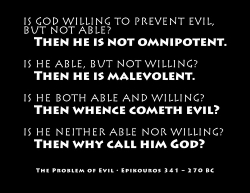
We’ve posted a summary of each book in Alvin Plantinga’s trilogy that covers contemporary theories of knowledge (Warrant: The Current Debate), Plantinga’s own theory of knowledge (Warrant and Proper Function), and Plantinga’s use of his theory of knowledge to argue that belief in God and the great things of the gospel are rational (Warranted Christian Belief).
One noteworthy section from Plantinga’s third book, Warranted Christian Belief, is the final chapter where he asks whether the problem of evil constitutes a defeater for warrant or rationality. He brings up three argumenst that have been made by academics and demonstrates that none of them legitimately constitute a challenge to the rationality of belief in the God of the Bible.
The following is an excerpt from our summary of Warranted Christian Belief, chapter 14.
Does the problem of evil constitute a defeater for warrant or rationality? First, there are evidential arguments. Rowe argues that there is no perfect being that would consider there to be such good that it justifies the existence of evils. However, we are not in an epistemic position to know whether there is such a good, and the glories of the incarnation and atonement may in fact constitute such good.
Draper’s argument is that the pattern of pain and pleasure makes it more epistemically probable than theism that “neither the nature nor the condition of sentient beings on earth is the result of benevolent or malevolent actions performed by non-human persons,” which may be called the “hypothesis of indifference” (470). Theism is then “evidentially challenged” because the evidence is stacked against it, given the rest of our knowledge. But many beliefs are evidentially challenged and we still rationally and warrantedly hold them, because our source of belief derives from something other than evidence, such as a priori knowledge, experience, or memory.
Lastly, there are nonargumentative defeaters. One may be confronted directly with the atrocities of this world and have an immediate impression that God must not exist (it does not depend on argument or deduction, but is immediate). The result would be something like a properly basic belief, with impulsional evidence, that God does not exist. But anyone with a properly restored sensus divinitatis will not disbelieve in God, even if they do question why he allows evil (which we do see in Scripture). In answer to the question of why then God would allow evil: “It is plausible to think that the best possible worlds God could have actualized contain the unthinkably great good of divine incarnation and redemption—but then, of course, also sin and suffering. God chooses one of these worlds to be actual—and in it, humankind suffers. Still, in this world there is also the marvelous opportunity for redemption and for eternal fellowship with God, an inconceivably great good that vastly outweighs the suffering we are called upon to endure” (489).
As you can see, Plantinga’s book has some serious and practical payoff. It’s one of the most important works written on Christian apologetics in decades. But rather than attempting to read the full 500 pages, why not first read our 10 page summary? Then you can decide if you want to tackle the whole book.
